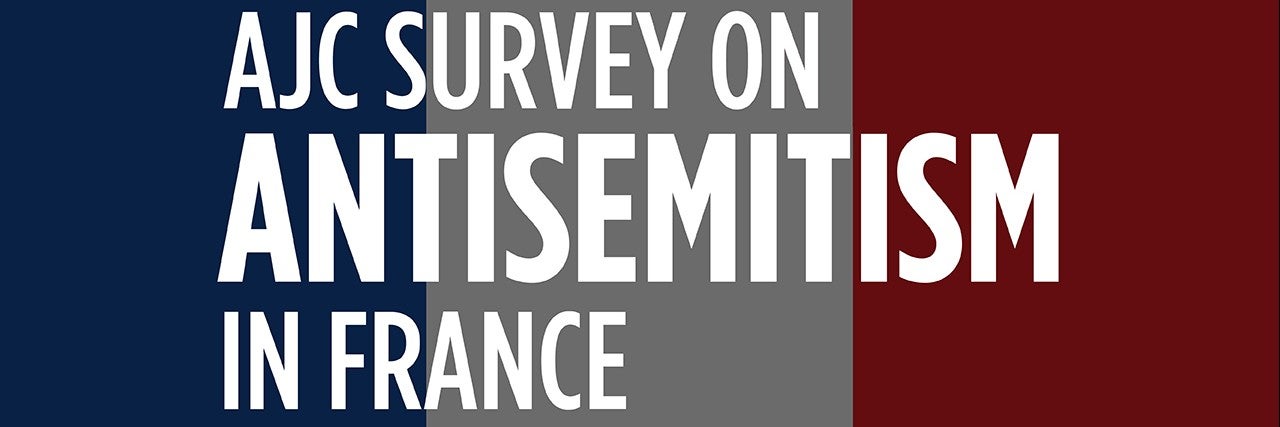January 24, 2020 — Paris, France
This piece originally appeared in FigaroVox.
By Victor Delage and Anne-Sophie Sebban-Bécache
Each year, the Ministry of the Interior publishes the number of antisemitic acts recorded in France. Every year, for nearly twenty years, the observation has been overwhelming: violence has been steadily increasing in our country, never dropping below the bar of 350 antisemitic acts per year since the early 2000s. Worse, the number of antisemitic acts (541) has increased by 73% in 2018, and already by 76% in the first half of 2019 compared to the first half of 2018.
Faced with these worrying statistics, which nevertheless underestimate the reality, the number of complaints from victims of an antisemitic act representing only the tip of the iceberg, the American Jewish Committee and the Foundation for Political Innovation have jointly designed and carried out the survey “Radiography of Anti-Semitism in France”, administered by IFOP. This unprecedented survey is based on the observation of two samples: the first, representative of French people of Jewish faith or culture aged 18 and over (505 people); the second, representative of the national population aged 18 and over (1,027 people).
According to our study, nearly three-quarters (70%) of French Jews report having been victims of at least one antisemitic act. Young people are the hardest hit: 84% of 18-24 years-old have experienced at least one antisemitic act. This fear of everyday life is not only explained by the murder of Ilan Halimi in 2006, by the killing of the Ozar Hatorah school in Toulouse by Mohammed Merah in 2012, or by the Hyper Cacher of the porte de Vincennes in 2015, or even by the desecration of Jewish cemeteries. The other reality is that antisemitism strikes everywhere and at any time: in the street (59% of victims claim to have been attacked there), in schools (54%) or in the workplace (46%). While French Jews represent less than 1 per cent of the French population, they alone are the target of more than 50 per cent of racist violence.
With the return of hateful prejudices, our Jewish compatriots have come to realize that a threat is hanging over them almost permanently, leading them to adopt strategies of avoidance or invisibility. Thus, a third of them refrain from displaying symbols, such as mezuzah (37%, and 47% for French Jews who have been victims of at least one antisemitic act) or a style of dress expressing their belonging to Jewish culture (33% and 40%). The fear of provoking animosity if not violence because of one's identity is so pervasive that "one prefers to go incognito."
Beyond material manifestations, a number of French Jews, whether practicing, traditionalist or even secular, have adopted certain behaviours. A quarter (25%) of them say they have already refrained from revealing their religion in the workplace. One might think that religion does not need to be mentioned in the workplace but, apart from the fact that it is in fact present, and probably increasingly so, the reason why French Jews conceal their membership is less the desire for discretion than the fear of unfriendly or even aggressive reactions. It is also these young people who avoid certain telephone conversations in public or who prefer not to answer certain questions from a passer-by for fear of provoking a hostile reaction.
But our study has at least one positive note. For 73% of the French people questioned, all characteristics taken together, antisemitism is not perceived as the problem of the Jewish community but as the problem of French society as a whole. The Foundation for Political Innovation and the American Jewish Committee had been working for years to raise that awareness.
This last lesson must commit our political leaders to more ambitious action in terms of the resources devoted to this struggle, on a larger scale so that all territories are involved, and firmer, so that existing law is fully applied. Extreme right-wing antisemitism has not disappeared and antisemitism on the extreme left has resurfaced over the last 20 years or so, but it is Islamist antisemitism that is asserting itself most forcefully. Moreover, it is perceived by members of the Jewish community as the main cause of antisemitism in France. In the general opinion, it is second only to the old antisemitic prejudices that remain. This is an essential point which must be taken up by those involved in the fight against antisemitism in order to carry out targeted actions aimed at each of the sources of this scourge. It is not yet too late. If it is not stopped and then reversed, the rise of antisemitism will reach and ruin the foundations of our political community.
Victor Delage is head of studies at the Foundation for Political Innovation and Anne-Sophie Sebban-Bécache is, Director of the American Jewish Committee in France (AJC Paris.



